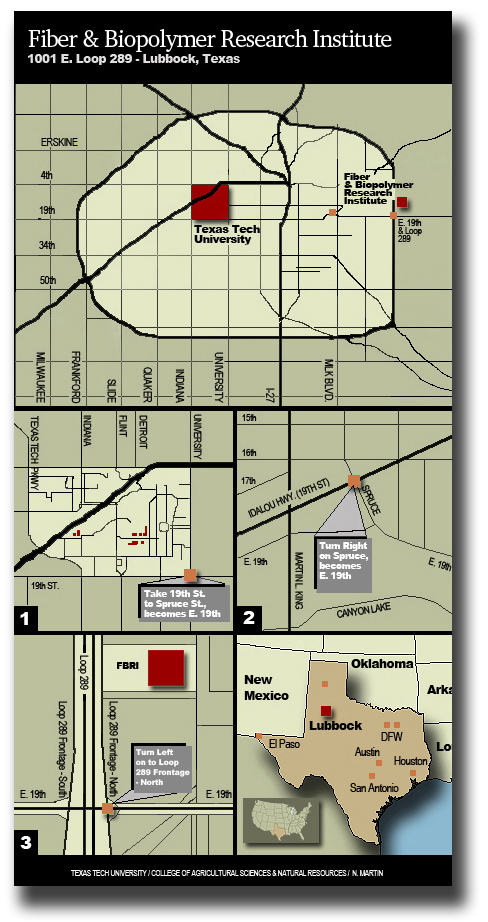Texas Tech's Fiber & Biopolymer Research Institute

Texas Tech University's Fiber and Biopolymer Research Institute (FBRI) is equipped and staffed to conduct research and development activities ranging from small-scale testing through large-scale manufacturing. A fundamental objective is to foster greater use of the natural fibers and increase textile manufacturing in Texas.
Activities revolve around:
- Researching, testing, and evaluating natural and man-made fibers
- Production and evaluation of yarns and fabrics; alternative textile processing systems
- Dyeing and finishing; and special yarn and fabric treatments.
110,000 Square Feet. As a facility of the Department of Plant and Soil Science within the Davis College of Agricultural Sciences & Natural Resources, it occupies 110,000 square feet of space allowing researchers to conduct testing and evaluation from the raw fiber stage through the finished textile product.
Facilities include a multimedia classroom, conference room and library, biopolymer research laboratory, materials evaluation laboratory, short staple spinning laboratory, weaving laboratory, chemical finishing laboratory, chemical properties and microscopy laboratory, flammability laboratory and fabric care laboratory.
Advanced Degrees. The facility is an integral part of Texas Tech's academic programs, and is used by Tech's Colleges of Engineering, Agricultural Sciences and Natural Resources, and Human Sciences for advanced degree programs and special problems courses as well as for augmenting select course curricula.
Research capabilities include:
- Molecular analysis of fiber structures
- Measurement of diverse fiber and fabric properties
- Relationships of fiber properties to spinning performance and to yarn and fabric quality
- Spinning performance of new cotton varieties; the development of new measurement technologies pertinent to fibers, yarns and fabrics
Several graduate-level courses are taught through the Department of Plant and Soil Science and the Department of Industrial Engineering. Professional education activities include the Texas International Cotton School, as well as short courses, conferences, seminars and special tours. In addition, scholars from throughout the world conduct post-graduate research at the center. More than 4,000 people visit annually.
1008NM15/ Photo Credit: Norman Martin / TTU-Davis College
Davis College of Agricultural Sciences & Natural Resources
-
Address
P.O. Box 42123, Lubbock, Texas 79409-2123, Dean’s Office Location: Goddard Building, Room 108 -
Phone
(806)742-2808
